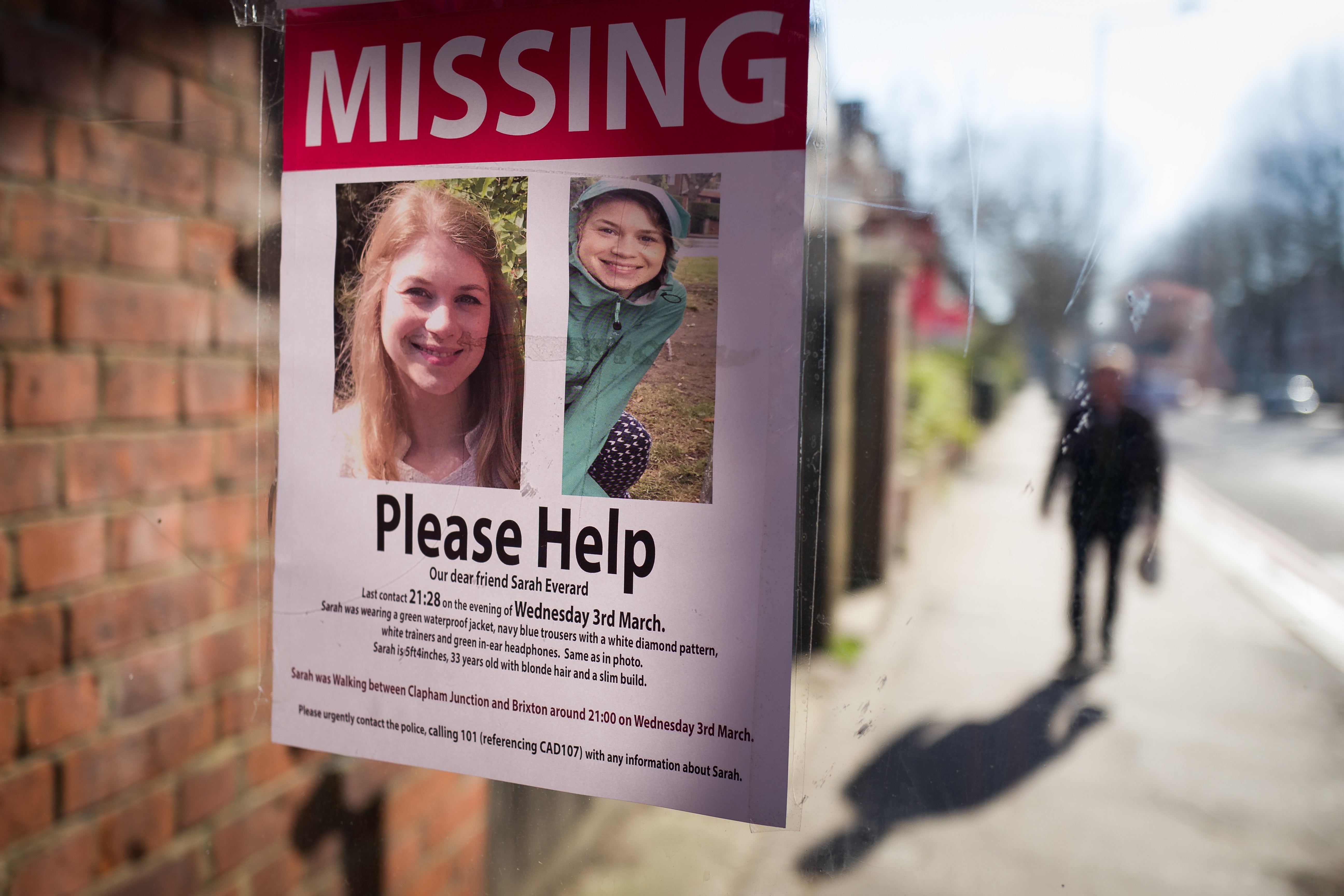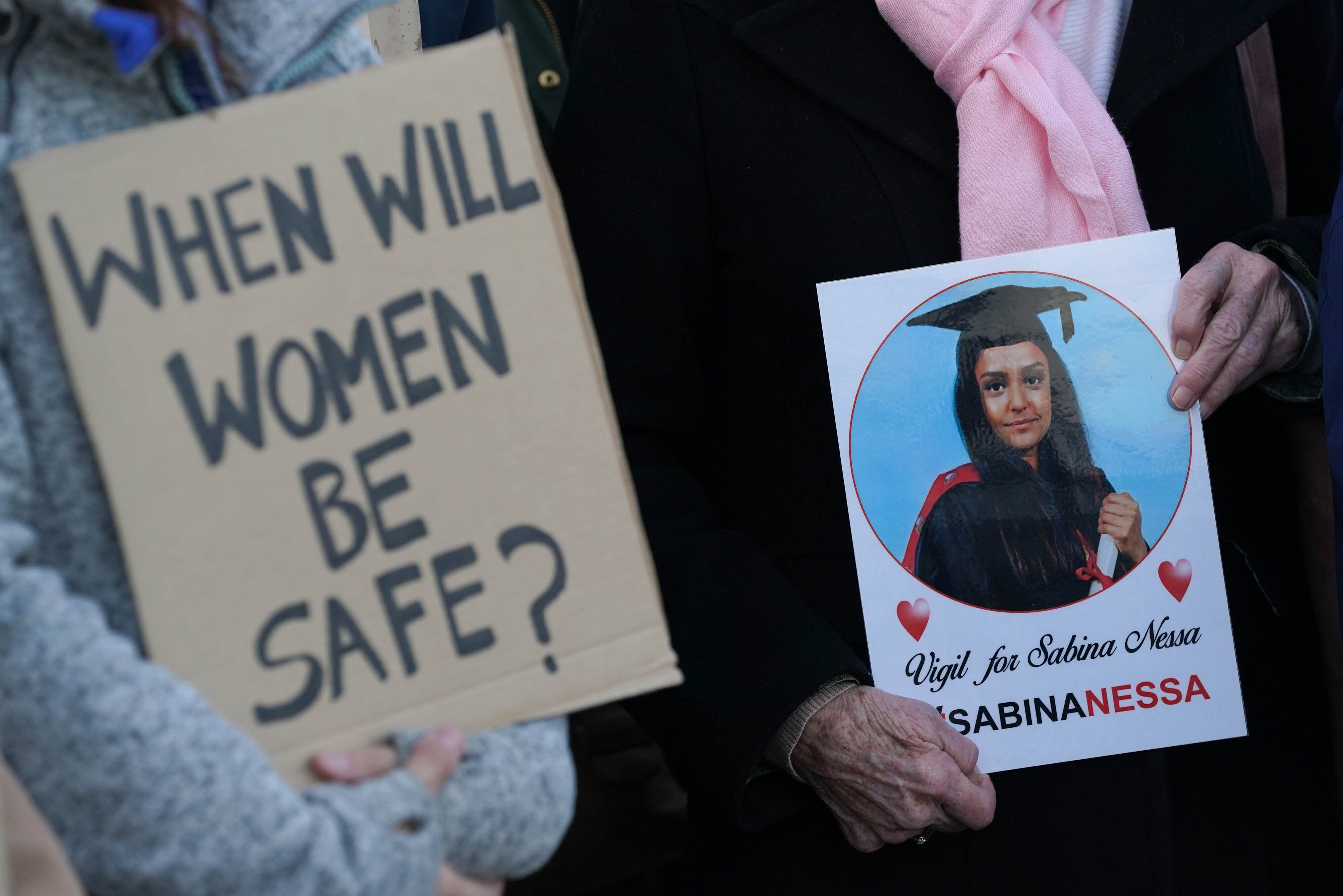
Sarah Everard is a name I wish I didn’t know. Yet I know her name, and you know her name, and a whole generation knows her name, because when she disappeared, a year ago today, she became a story that made headlines.
Sarah Everard made headlines because she was young, pretty, white, middle class, and she was “only” walking home, all of which made her the “perfect victim”. Sarah Everard made headlines because what unfolded was an elaborate, escalating tale of horror, laced with a devastating abuse of power. Sarah Everard made headlines because her murder spoke directly to our darkest of fears; we would have got in that police car, we whispered to each other, stunned, sickened.
In the immediate aftermath of a 33-year old kidnapped, raped and murdered by a serving Metropolitan Police constable, there was a national reckoning – across the press, in parliament, among conversations with friends, colleagues, and around dinner tables. Was this heinous act the inevitable consequence of a society that has appeased violence against women?
“But it is so rare,” cried columnists in response. Statistically, being kidnapped and murdered by a stranger is rare. Statistically, your home with your male partner is much more unsafe. But while the odds might be low, they are not impossible. And that’s a truth you carry, and I carry, and we know it every time we find ourselves on a dark street alone. Maybe next time it will be me. Maybe next time it will be you. And that’s why we clutch keys between fingers, why we hold our breath when a stranger sits a bit too close on the Tube, why we wear certain clothes in an effort to hide our bodies.
You know, and I know, this so-called “rare” threat could be anywhere and everywhere because we have all had enough violations, near-misses, unpleasant encounters at the hands of men in the street, to wonder if it is so rare after all. And even when a police officer issued a fake arrest in order to strangle and rape a young woman, still they tell us we’re hysterical.
The Clapham Common vigil for Everard on 13 March 2021 made plain what we were up against. In a society that minimises violence against women it follows that women’s safety isn’t a priority, even for the police. It certainly wasn’t a priority to allow women to mourn for a woman killed. It wasn’t a priority when officers manhandled women to the ground during the peaceful gathering. It also wasn’t a priority when Couzens had previous offences and was known as “The Rapist” but kept his job. In response to Sarah’s murder, North Yorkshire police commissioner Philip Allott said, “women need to be streetwise”. At least he had the decency to resign afterwards.

Soon the government started talking about street lighting and flagging down buses for help and women across the country groaned in despair and cursed at the heavens for the staggering incompetence of it all. Little solace can be found in the life sentencing of Wayne Couzens or the prosecution of officers he shared a WhatsApp group with. The barrel is dripping in rot.
After Sarah, some rightly demanded we heard the stories of other missing and murdered women, like Nicole Smallman and Bibaa Henry, women whose murders in June 2020, nine months before Sarah, were overlooked by the police, the press and the public because they were Black women, and the world met the remarkable Mina Smallman who has fought so hard and with such dignity for her daughters. After Sarah, in April 2021, 53-year-old Kent PCSO Julia James was murdered when out walking her dog. In September 2021, 28-year-old Sabina Nessa, a schoolteacher, a picture of promise in a mortarboard, was murdered when taking a five-minute walk to meet a friend for a drink on Friday evening.
In an ideal world we won’t remember the names of women murdered by men because there wouldn’t be any. In the real world, we have to keep asking why we remember some and not others.
Today, 12 months on, the question of women’s safety feels as precarious as it ever did. Vicky, 35, who lives in Bristol, says she’s always been extremely aware of her safety as a woman at night, but the murder of Everard made her think twice about the police. “If we can’t trust them, where does that leave us?”.
I’ve been walking home or waiting at a bus stop, and I’ve thought of Sarah. I’ve thought about how frightened she must have been. I thought about how easily it could have been me
Recent text messages from the Charing Cross branch of the Met revealed a culture of vile misogyny and racism; “jokes” about rape, child abuse and domestic violence from 14 officers, nine of whom are still serving. Such revelations only serve to reinforce Vicky’s worries. “It’s honestly got the point now that I don’t know if I would bother calling the police if something happened to me,” she tells TheIndependent. Weeks after Sarah’s kidnap, Susannah Fish, former chief constable of Nottinghamshire police, a woman who spent 30 years of her career inside the force, said exactly the same thing on BBC Radio 4’s Woman’s Hour.
For 26-year-old Megan, from south London, the city seemed different after Sarah’s murder: “I often walk along Poynders Road, [the road where Everard was abducted] and I would never have thought anything could happen there as it’s such a busy spot. It’s made me really re-evaluate what I think of as an unsafe place.”
But it was the combination of Sarah’s murder alongside the psychological impact of Covid which made Megan feel considerably less safe.
“Pre-lockdown, I’d regularly be coming home from post-work drinks at 11 or 12 and it wouldn’t really register that there could be a risk but now that I’ve become so accustomed to being at home at nighttime, the idea of being out at 11pm alone is suddenly a bit more daunting. I think Everard’s murder happening in the midst of the lockdown really heightened that nervousness. Around that time several of my friends would only travel by Uber if they were out in the evening because they were frightened. I even asked my boyfriend to meet me on the way home from dinners with friends a couple of times, which I would never have done before.”
Megan gives insight into how post-pandemic ways of living have compounded some of these fears: “There have been quite a few times over the last few months where it’s got to just 8pm when I’ve really wanted to go on a walk as I’ve been working from home all day but if my boyfriend isn’t around to come along, I won’t go.” She also echoes the frustration so many women feel: “Walking around residential areas at night just doesn’t seem like a good idea, which is frustrating as my boyfriend and brother don’t even give it a second thought.”

Anxiety about safety when re-entering into the world after lockdowns wasn’t only Megan’s concern. Independent journalist Mared Parry launched a petition in October of 2021 to get the Night Tube reopened before the winter to improve women’s safety, which received 125,000 signatures. On her Change.org page, Parry wrote “It sickens me that multiple innocent women have to be murdered in order for people to listen when we tell them London is dangerous for women.”
Gemma, 30, in Crouch End, can find the conversation “a bit much”. She has to drown out so much of the talk about women’s safety because, she says, it would stop her from leaving the house. “I don’t want to be naive or unsafe, but I could feel myself getting paranoid. There have been times at night, when I’ve been walking home or waiting at a bus stop, and I’ve thought of Sarah [Everard]. I’ve thought about how frightened she must have been. I thought about how easily it could have been me. I try just to ignore those thoughts and keep my wits about me. It’s all you can do.”
It wasn’t that Everared’s murder revealed or exposed something. The horror of what happened to her seemed to confirm what we all knew but tried not to think about
Some women I speak to tell me they think of Everard from time to time, but their behaviour hasn’t altered. Maybe they were particularly cautious in the immediate weeks after her body was discovered but, for the majority, they carry on as they always have: looking over their shoulder; crossing the street; planning routes in advance; texting friends when they get home. When they were younger, they took “more risks”, but now, in their 30s and 40s, they can afford Ubers. Essentially, they tell me, they have at least a decade of hard-earned experience in strategising the safest way home. As one friend said, “It wasn’t that Everared’s murder revealed or exposed something. It was almost the opposite. The horror of what happened to her seemed to confirm what we all knew but tried not to think about.”
On the day of Couzens’ sentencing, when the world learnt of the harrowing details of what happened to Everard, and we heard the haunting testimonies of her parents and her sister, I was abroad in a city I didn’t know. I’d been travelling for weeks, alone, and I’d been fine. But that evening, after time lost to newspaper articles and Twitter threads of grief, I needed to leave my Airbnb for dinner. I had only two blocks to walk. It was just past 6.30pm and dark.
I walked along the well-lit, quiet residential street. My feet moved as quickly as they could. My head spinning at the slightest noise. I arrived at the restaurant, my heart pumping through my chest, covered in sweat. A woman behind the bar looked at me. Without thinking I said, “Is this neighbourhood safe?” “Sure”, she said. “Are you okay? Something happen?” I sat down and took a deep breath. I couldn’t explain the invisible threat pumping through my veins. I could only think of Everard, getting into that car. The barmaid started to talk again. “I mean, sure. It’s mostly safe. But, you know, I drive home most evenings even though I could walk. Just to be safe”.







